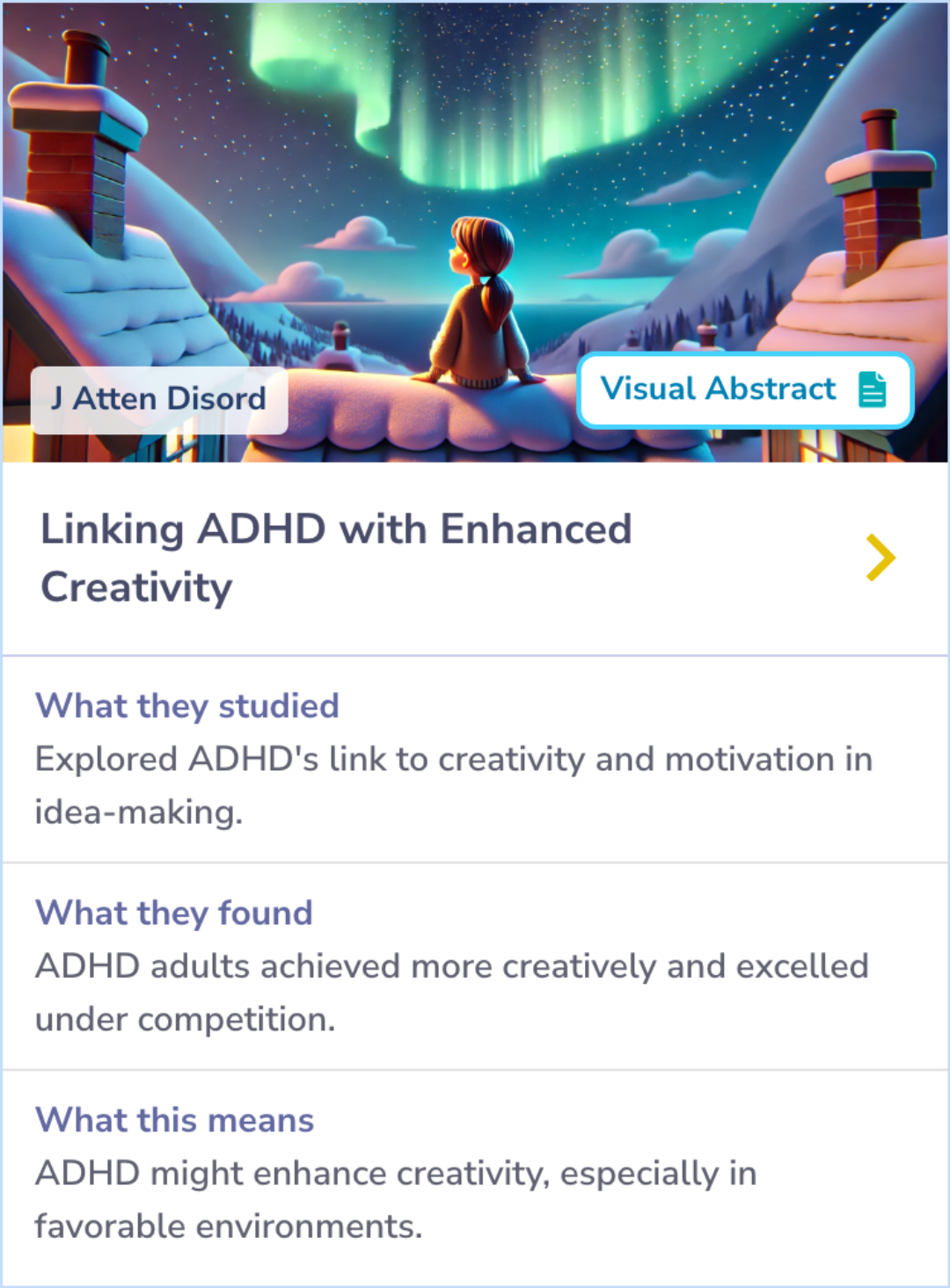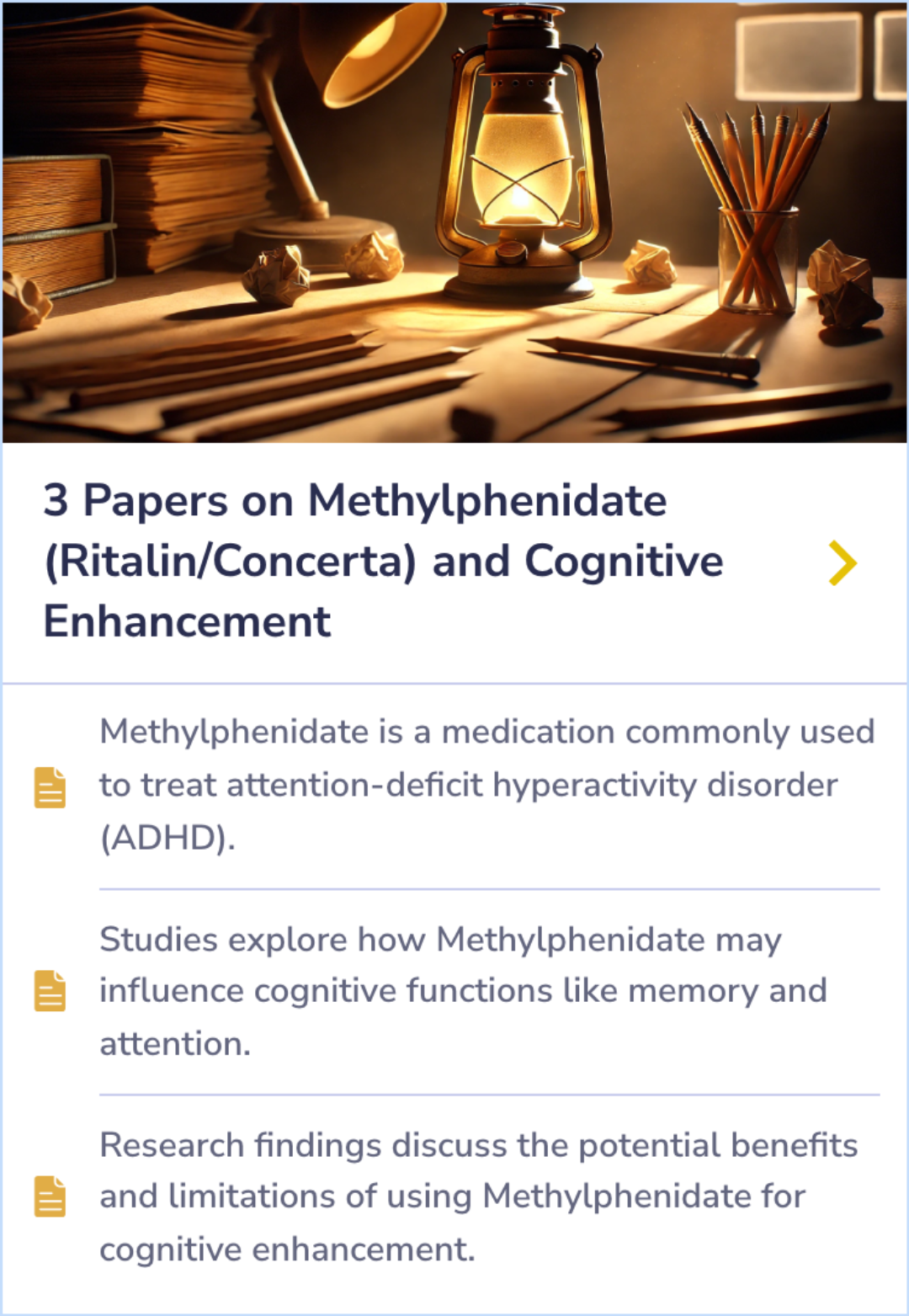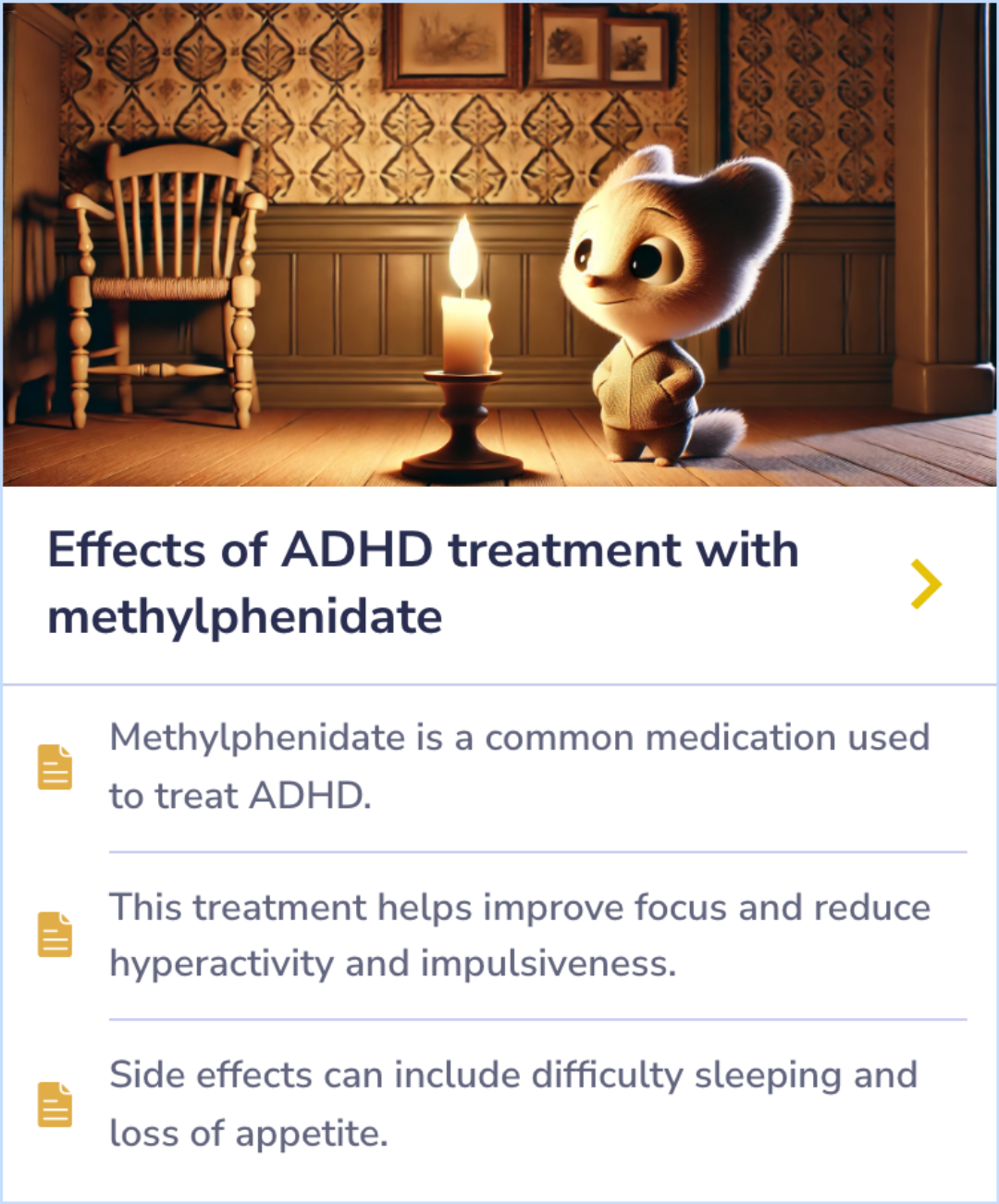Adderall
Evidence Based Answers
Do ADHD medications like Adderall affect creativity in healthy individuals?
ADHD medications improve focus but may reduce creative thinking in some. Studies show mixed results and individual factors play a role in how creativity is impacted.
Published: October 24, 2024
Click to explore a section:
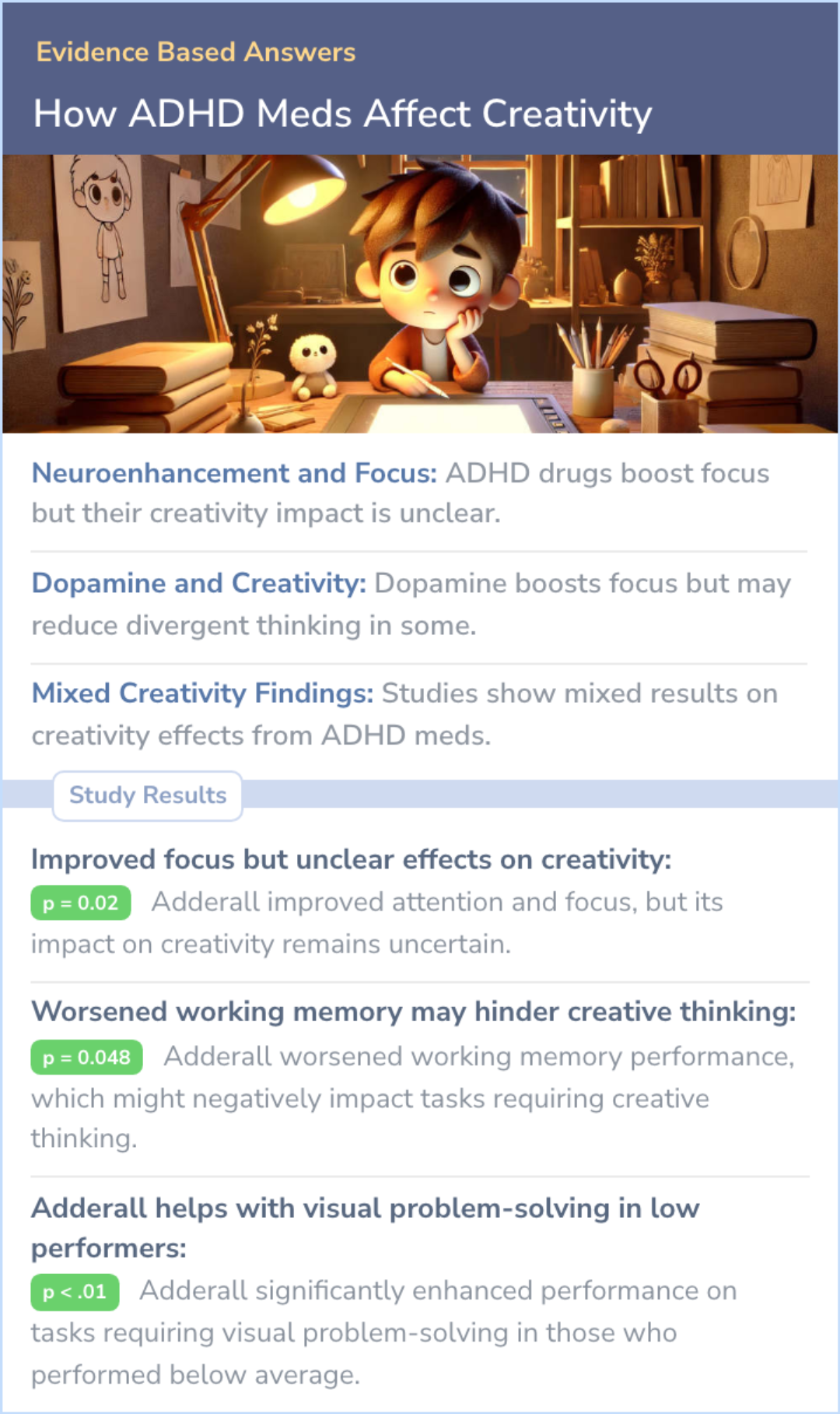
ADHD medications may enhance focus but the impact on creativity varies. Findings show mixed results, with some suggesting a reduction in creative thought.
Studies Summary
🎨
Adderall's effects on creativity vary
Studies have shown that Adderall can impact creativity differently depending on the individual's baseline creativity level. Those with lower baseline creativity may experience an improvement, while those with higher baseline creativity might see no effect or even impairment in their creative abilities.
🧠
Perception vs. reality in cognitive enhancement
Although many individuals perceive an improvement in cognitive abilities when taking Adderall, research indicates that the actual enhancement is minimal. This discrepancy highlights the importance of understanding the drug's true effects on creativity and cognitive tasks in healthy adults.
🔄
Adderall's mixed effect on cognitive tasks
Studies recognize the mixed effects of Adderall on cognitive tasks in healthy individuals, noting that while emotional and physical responses may be influenced, overall cognitive enhancement, particularly in terms of creativity, is minimal.
Highly Cited Studies
Long term Effects of Methylphenidate in Adults
Peer Reviewed Study 1
Adderall's Varied Impact on Creativity
Peer Reviewed Study 2
Adderall's Impact on Creativity and Cognitive Abilities in Healthy Adults
Peer Reviewed Study 3
Minimal Impact of Adderall on Cognitive Performance in Healthy Individuals
Background: Exploring Neuroenhancement and Its Impact on Creativity
Neuroenhancement involves using substances like ADHD medications to boost cognitive function in healthy individuals. These drugs, originally developed for attention disorders, are now widely used to enhance focus and productivity. However, their effects on creativity are less clear. While ADHD medications can improve focus by altering brain chemistry, their impact on creativity—especially in healthy individuals—remains uncertain and varies from person to person. Some research suggests that these drugs might reduce the brain's ability to engage in spontaneous, creative thought, though findings are mixed.
The relationship between enhanced focus and creativity is complex, as these drugs may benefit some cognitive functions while potentially hindering others.
The relationship between enhanced focus and creativity is complex, as these drugs may benefit some cognitive functions while potentially hindering others.
“
Source Quotes:
Apparently, psychostimulants are popular among healthy people seeking neuroenhancement.,The first, a stimulant used to treat attention-deficit hyperactivity disorder (ADHD), is known to have been extensively misused, especially by college students as a 'study aid.'
AMP-induced increases in DA and 5-HT efflux in the caudate and NE efflux in the hippocampus may influence creative processes through their effects on these neurotransmitter systems.,MPH reduced functional connectivity between the nucleus accumbens and the basal ganglia, medial prefrontal cortex, and temporal cortex.
Background: How ADHD Medications Affect Creativity
ADHD medications like Adderall work by increasing neurotransmitters such as dopamine and norepinephrine in the brain. These chemicals are important for managing attention and executive functions but also affect creativity. While increased dopamine activity may enhance focus and linear thinking, it could suppress divergent thinking, which is often linked to creativity. The effects on creativity depend on various factors, including individual differences and the specific cognitive tasks involved.
Research shows that these drugs may alter brain regions related to reward processing and decision-making, potentially impacting creativity. However, the outcomes for healthy individuals are still under investigation, and the results vary widely.
Research shows that these drugs may alter brain regions related to reward processing and decision-making, potentially impacting creativity. However, the outcomes for healthy individuals are still under investigation, and the results vary widely.
“
Source Quotes:
AMP and MPH increase corticostriatal catecholamine availability in different ways. These increases in DA and NE availability affect corticostriatal systems that subserve behaviors related to cognition and executive function, risky decision making, emotional responsivity, and the regulation of reward processes.,The effects of these drugs on creativity can vary widely depending on individual differences and the context in which the drug is used.
Peer Reviewed Study
Study: Adderall's Varied Impact on Creativity
This study explored the effects of Adderall on creativity in healthy young adults. Researchers conducted a double-blind, placebo-controlled experiment using four creativity tests. Adderall impacted performance on convergent tasks, with effects varying by the individual's baseline creativity. Those with lower baseline creativity showed improvement, while those with higher baseline creativity experienced impairment or no effect.
The study found no clear evidence that Adderall negatively impacts divergent creativity.
The study found no clear evidence that Adderall negatively impacts divergent creativity.
author
Farah MJ, Haimm C, Sankoorikal G, Smith ME, Chatterjee A
journal
Psychopharmacology
Date Published
2009-01
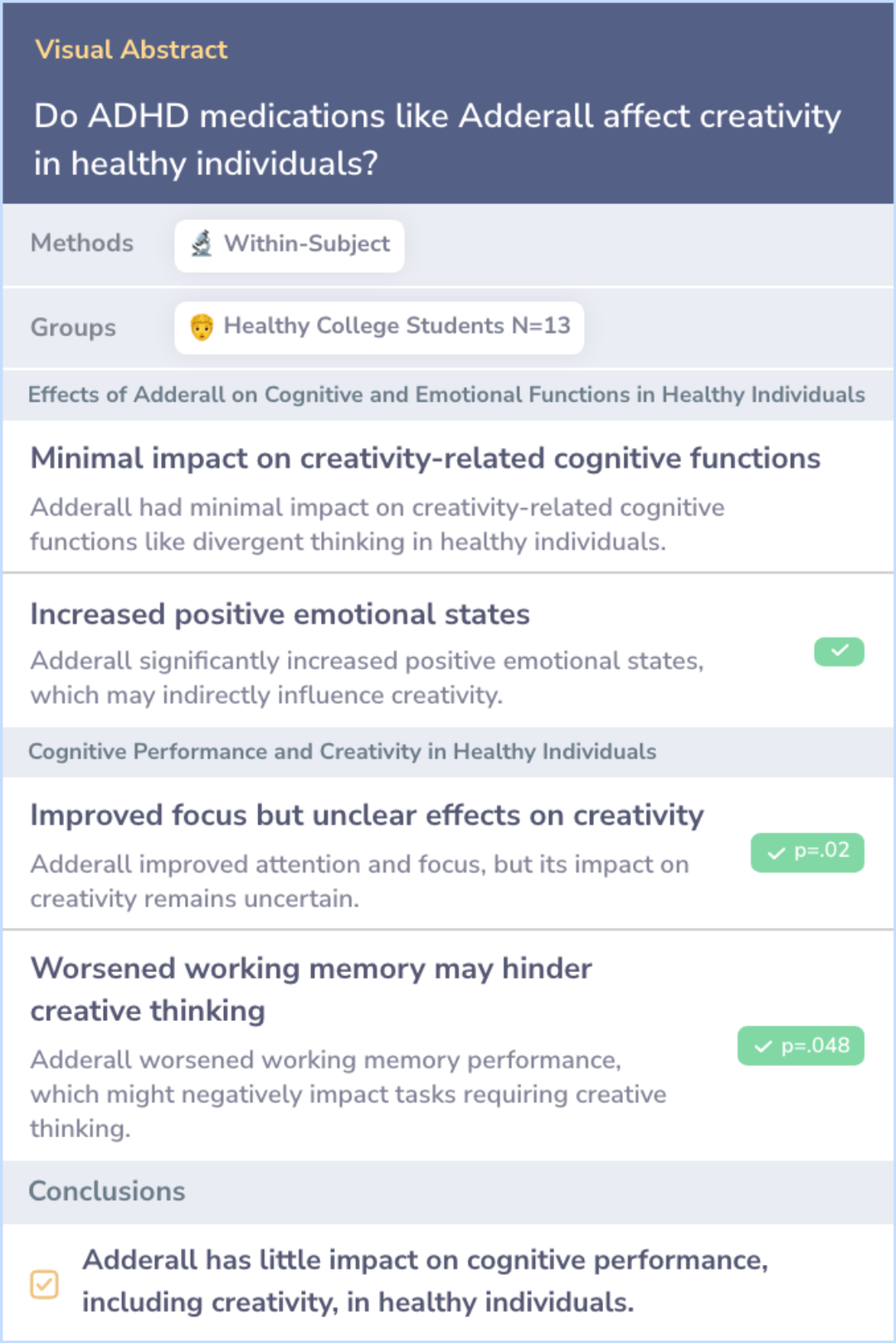
Peer Reviewed Study
Study: Adderall's Impact on Creativity and Cognitive Abilities in Healthy Adults
The study explored the effects of Adderall (mixed amphetamine salts, MAS) on various cognitive abilities, including creativity, in healthy young adults. It found that MAS did not generally enhance any cognitive abilities, including convergent creativity. However, participants believed their cognitive performance was improved when taking the drug, even though objective measures showed minimal actual enhancement.
The study also suggested that any cognitive effects were small and mostly observed in individuals with lower baseline ability in specific tasks.
The study also suggested that any cognitive effects were small and mostly observed in individuals with lower baseline ability in specific tasks.
author
Ilieva I, Boland J, Farah MJ
journal
Neuropharmacology
Date Published
2013 Jan
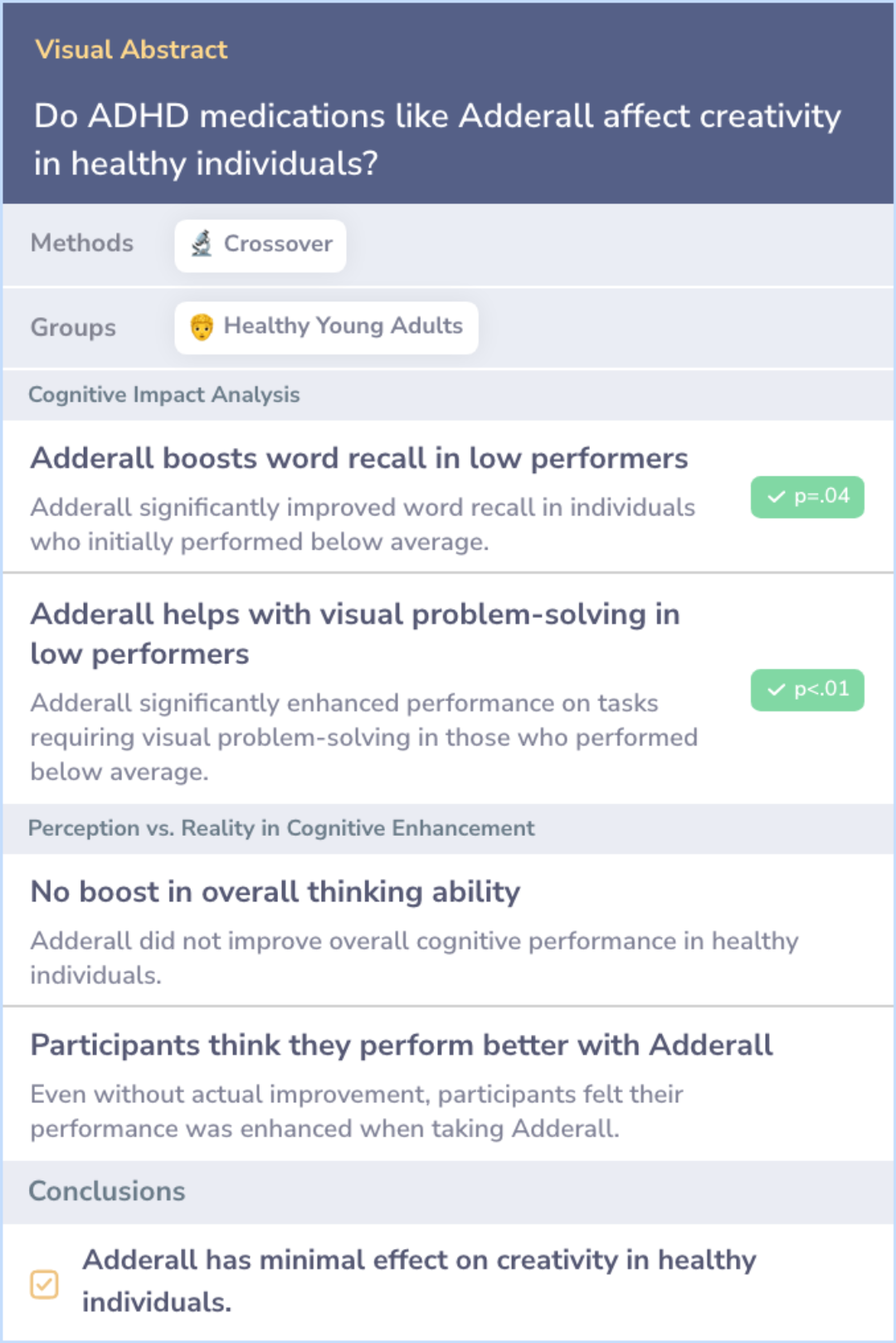
Peer Reviewed Study
Study: Minimal Impact of Adderall on Cognitive Performance in Healthy Individuals
This study explored the impact of Adderall, a common ADHD medication, on various cognitive and emotional functions in healthy college students without ADHD. The study found that Adderall had minimal and mixed effects on cognitive processes related to neurocognitive enhancement. However, the medication had substantial effects on autonomic responses, subjective drug experiences, and positive emotional states.
These findings suggest that while Adderall may influence emotional and physical responses, it has little impact on cognitive performance, including creativity, in healthy individuals.
These findings suggest that while Adderall may influence emotional and physical responses, it has little impact on cognitive performance, including creativity, in healthy individuals.
author
Weyandt LL, White TL, Gudmundsdottir BG, Nitenson AZ, Rathkey ES, De Leon KA, Bjorn SA
journal
Pharmacy
Date Published
2018-06-27

Key Takeaways
Conclusions
ADHD medications like Adderall, designed to enhance focus, show varied effects on creativity in healthy individuals. Studies indicate that while Adderall may marginally enhance convergent thinking tasks for individuals with lower baseline creativity, it can impair or have no effect on those with higher baseline creativity.
Research suggests minimal overall impact on cognitive abilities, with subjective perceptions of enhancement often exceeding actual cognitive improvements. The interplay between increased focus and creative potential remains complex and dependent on individual factors.
Research suggests minimal overall impact on cognitive abilities, with subjective perceptions of enhancement often exceeding actual cognitive improvements. The interplay between increased focus and creative potential remains complex and dependent on individual factors.

Evidence Summary
Creative Boosts for ADHD in Competitive Settings
Adults with ADHD reported having more real-world creative achievements. The study found no significant differences in intrinsic motivation during idea generation between those with ADHD and the control group. However, individuals with ADHD exhibited a tendency to produce more original ideas when motivated by the competition. They also perceived themselves as more creative in distinct domains, suggesting a link between goal-directed motivation and their creative expression.
Evidence Summary
Navigating Cognitive Effects of ADHD Medications
Dive into how different reactions to these medications highlight a complex mosaic of creativity in individuals. While some might find enhanced focus, others may note a dip in spontaneous creative thinking. Consider how these effects fluctuate.
Delve into the idea that increased linear thinking could suppress the ability for divergent thought, sparking intriguing conversations on how creativity manifests differently.
Delve into the idea that increased linear thinking could suppress the ability for divergent thought, sparking intriguing conversations on how creativity manifests differently.
Evidence Summary
Methylphenidate: Balancing Focus and Side Effects in ADHD Treatment
Methylphenidate is a widely used medication for treating ADHD, primarily aiding in improving focus while reducing symptoms such as hyperactivity and impulsiveness. However, individuals using it may experience side effects, including difficulties with sleep and reduced appetite.
The slide content highlights practical aspects of ADHD treatment, touching on both its beneficial effects and potential drawbacks. The link to creativity remains a nuanced facet not deeply explored.
The slide content highlights practical aspects of ADHD treatment, touching on both its beneficial effects and potential drawbacks. The link to creativity remains a nuanced facet not deeply explored.
